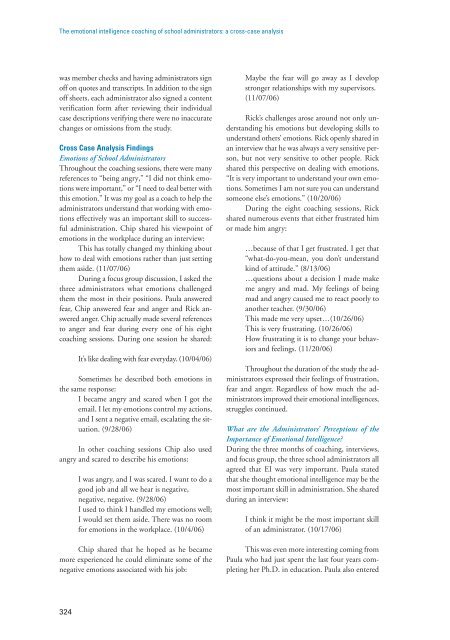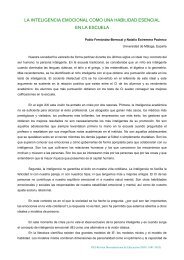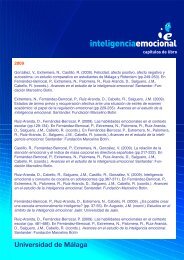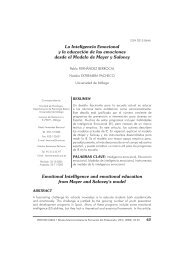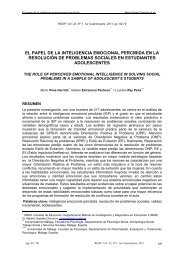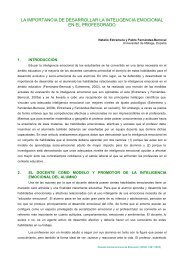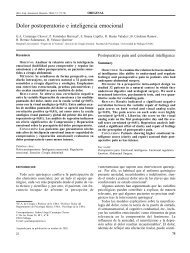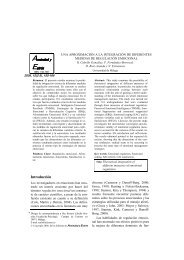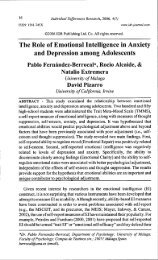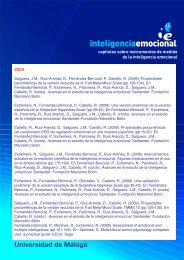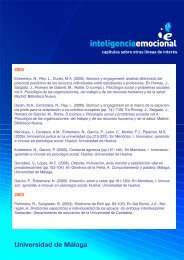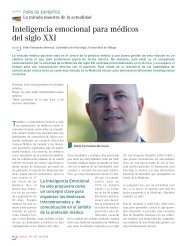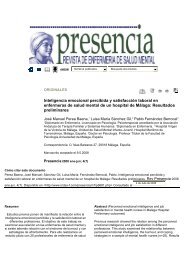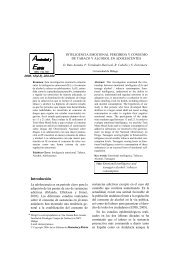- Page 1 and 2:
La Fundación Marcelino Botín, cre
- Page 3 and 4:
Créditos Coordinación Pablo Fern
- Page 5 and 6:
111 A review of the relationship be
- Page 7 and 8:
365 Inteligencia emocional, conocim
- Page 9 and 10:
Prólogo El I Congreso Internaciona
- Page 11 and 12:
Avances en el estudio de la Intelig
- Page 13 and 14:
Avances en el estudio de la Intelig
- Page 15 and 16:
Avances en el estudio de la Intelig
- Page 17 and 18:
Avances en el estudio de la Intelig
- Page 19 and 20:
Avances en el estudio de la Intelig
- Page 21:
Avances en el estudio de la Intelig
- Page 24 and 25:
Interrelación entre: Inteligencia
- Page 26 and 27:
Interrelación entre: Inteligencia
- Page 29 and 30:
Avances en el estudio de la Intelig
- Page 31 and 32:
Avances en el estudio de la Intelig
- Page 33 and 34:
Avances en el estudio de la Intelig
- Page 35 and 36:
Avances en el estudio de la Intelig
- Page 37 and 38:
Avances en el estudio de la Intelig
- Page 39 and 40:
Avances en el estudio de la Intelig
- Page 41 and 42:
El Test de Sensibilidad a las Inter
- Page 43 and 44:
El Test de Sensibilidad a las Inter
- Page 45 and 46:
El Test de Sensibilidad a las Inter
- Page 47 and 48:
La Inteligencia Emocional en Brasil
- Page 49 and 50:
La Inteligencia Emocional en Brasil
- Page 51 and 52:
La Inteligencia Emocional en Brasil
- Page 53 and 54:
Trait Emotional Intelligence eviden
- Page 55 and 56:
Trait Emotional Intelligence Table
- Page 57 and 58:
Trait Emotional Intelligence akness
- Page 59 and 60:
Trait Emotional Intelligence (2002)
- Page 61 and 62:
El estilo rumiativo: Causas, consec
- Page 63 and 64:
El estilo rumiativo: Causas, consec
- Page 65 and 66:
El estilo rumiativo: Causas, consec
- Page 67 and 68:
El estilo rumiativo: Causas, consec
- Page 69 and 70:
Si Piensas Constructivamente No Nec
- Page 71 and 72:
Si Piensas Constructivamente No Nec
- Page 73 and 74:
Avances en el estudio de la Intelig
- Page 75 and 76:
Avances en el estudio de la Intelig
- Page 77:
Avances en el estudio de la Intelig
- Page 80 and 81:
Why (and how) the emotional intelli
- Page 82 and 83:
Why (and how) the emotional intelli
- Page 84 and 85:
Why (and how) the emotional intelli
- Page 86 and 87:
Relación entre Inteligencia Emocio
- Page 88 and 89:
Relación entre Inteligencia Emocio
- Page 91 and 92:
Avances en el estudio de la Intelig
- Page 93 and 94:
Avances en el estudio de la Intelig
- Page 95 and 96:
Avances en el estudio de la Intelig
- Page 97 and 98:
Avances en el estudio de la Intelig
- Page 99 and 100:
Avances en el estudio de la Intelig
- Page 101 and 102:
Avances en el estudio de la Intelig
- Page 103 and 104:
Avances en el estudio de la Intelig
- Page 105 and 106:
Avances en el estudio de la Intelig
- Page 107 and 108:
Avances en el estudio de la Intelig
- Page 109:
Avances en el estudio de la Intelig
- Page 112 and 113:
Preliminary results of the Children
- Page 114 and 115:
Preliminary results of the Children
- Page 117 and 118:
Avances en el estudio de la Intelig
- Page 119 and 120:
Avances en el estudio de la Intelig
- Page 121:
Avances en el estudio de la Intelig
- Page 124 and 125:
Propiedades psicométricas de la ve
- Page 126 and 127:
Propiedades psicométricas de la ve
- Page 129 and 130:
Avances en el estudio de la Intelig
- Page 131 and 132:
Avances en el estudio de la Intelig
- Page 133 and 134:
Avances en el estudio de la Intelig
- Page 135 and 136:
Avances en el estudio de la Intelig
- Page 137 and 138:
Avances en el estudio de la Intelig
- Page 139:
Avances en el estudio de la Intelig
- Page 142 and 143:
Proceso de validación de la Escala
- Page 144 and 145:
Proceso de validación de la Escala
- Page 146 and 147:
2 | ASPECTOS APLICADOS
- Page 148 and 149:
“Contar historias”, ¿nueva her
- Page 150 and 151:
“Contar historias”, ¿nueva her
- Page 152 and 153:
“Contar historias”, ¿nueva her
- Page 154 and 155:
Inteligencia emocional, Alexitimia
- Page 156 and 157:
Inteligencia emocional, Alexitimia
- Page 158 and 159:
Avances en el estudio de la Intelig
- Page 160 and 161:
Avances en el estudio de la Intelig
- Page 162 and 163:
Avances en el estudio de la Intelig
- Page 164 and 165:
Avances en el estudio de la Intelig
- Page 166 and 167:
Avances en el estudio de la Intelig
- Page 168 and 169:
Avances en el estudio de la Intelig
- Page 170 and 171:
Avances en el estudio de la Intelig
- Page 172 and 173:
Avances en el estudio de la Intelig
- Page 174 and 175:
Avances en el estudio de la Intelig
- Page 176 and 177:
El papel de la Inteligencia Emocion
- Page 178 and 179:
Avances en el estudio de la Intelig
- Page 180 and 181:
Efecto modulador del optimismo en l
- Page 182 and 183:
Docencia: Trabajo en equipo y emoci
- Page 184 and 185:
Docencia: Trabajo en equipo y emoci
- Page 186 and 187:
La línea de la vida: integración
- Page 188 and 189:
Avances en el estudio de la Intelig
- Page 190 and 191:
Dolor postoperatorio e inteligencia
- Page 192 and 193:
Avances en el estudio de la Intelig
- Page 194 and 195:
Avances en el estudio de la Intelig
- Page 196 and 197:
Avances en el estudio de la Intelig
- Page 198 and 199:
Avances en el estudio de la Intelig
- Page 200 and 201:
Avances en el estudio de la Intelig
- Page 202 and 203:
Avances en el estudio de la Intelig
- Page 204 and 205:
Avances en el estudio de la Intelig
- Page 206 and 207:
Avances en el estudio de la Intelig
- Page 208 and 209:
Avances en el estudio de la Intelig
- Page 210:
Avances en el estudio de la Intelig
- Page 213 and 214:
Inteligencia emocional y manejo de
- Page 215 and 216:
Inteligencia emocional y manejo de
- Page 217 and 218:
Inteligencia emocional y manejo de
- Page 219 and 220:
Estudio de la influencia de factore
- Page 221 and 222:
Estudio de la influencia de factore
- Page 223 and 224:
Estudio de la influencia de factore
- Page 226 and 227:
Avances en el estudio de la Intelig
- Page 228 and 229:
Avances en el estudio de la Intelig
- Page 230 and 231:
Avances en el estudio de la Intelig
- Page 232 and 233:
Inteligencia y Arquitectura Emocion
- Page 234 and 235:
Inteligencia y Arquitectura Emocion
- Page 236 and 237:
Inteligencia y Arquitectura Emocion
- Page 238 and 239:
Avances en el estudio de la Intelig
- Page 240 and 241:
Avances en el estudio de la Intelig
- Page 242 and 243: Avances en el estudio de la Intelig
- Page 244 and 245: Los moldes mentales de la esquizofr
- Page 246 and 247: Los moldes mentales de la esquizofr
- Page 248 and 249: Avances en el estudio de la Intelig
- Page 250 and 251: Avances en el estudio de la Intelig
- Page 252 and 253: Avances en el estudio de la Intelig
- Page 254 and 255: Avances en el estudio de la Intelig
- Page 256 and 257: Los Moldes Mentales reflejados en l
- Page 258 and 259: Los Moldes Mentales reflejados en l
- Page 260 and 261: Los Moldes Mentales reflejados en l
- Page 262 and 263: ¿Qué aspectos de la inteligencia
- Page 264 and 265: ¿Qué aspectos de la inteligencia
- Page 266 and 267: ¿Qué aspectos de la inteligencia
- Page 268 and 269: Relación entre inteligencia emocio
- Page 270 and 271: Relación entre inteligencia emocio
- Page 272 and 273: Relación entre inteligencia emocio
- Page 274 and 275: La IEP y su relación con la presen
- Page 276 and 277: La IEP y su relación con la presen
- Page 278 and 279: La IEP y su relación con la presen
- Page 280 and 281: Control de la violencia en jóvenes
- Page 282 and 283: Control de la violencia en jóvenes
- Page 284 and 285: Avances en el estudio de la Intelig
- Page 286 and 287: Avances en el estudio de la Intelig
- Page 288 and 289: Avances en el estudio de la Intelig
- Page 290 and 291: Avances en el estudio de la Intelig
- Page 294 and 295: Avances en el estudio de la Intelig
- Page 296 and 297: Avances en el estudio de la Intelig
- Page 298 and 299: Avances en el estudio de la Intelig
- Page 300 and 301: Avances en el estudio de la Intelig
- Page 302 and 303: Inteligencia Emocional Autoinformad
- Page 304 and 305: Inteligencia Emocional Autoinformad
- Page 306 and 307: Avances en el estudio de la Intelig
- Page 308 and 309: Avances en el estudio de la Intelig
- Page 310 and 311: Avances en el estudio de la Intelig
- Page 312 and 313: Avances en el estudio de la Intelig
- Page 314 and 315: Avances en el estudio de la Intelig
- Page 316 and 317: Avances en el estudio de la Intelig
- Page 318 and 319: Relación entre la experiencia y la
- Page 320 and 321: Relación entre la experiencia y la
- Page 322 and 323: Relación entre la experiencia y la
- Page 324 and 325: Inteligencia emocional autoinformad
- Page 326 and 327: Inteligencia emocional autoinformad
- Page 328 and 329: Inteligencia emocional autoinformad
- Page 330 and 331: Avances en el estudio de la Intelig
- Page 332 and 333: Avances en el estudio de la Intelig
- Page 334 and 335: Avances en el estudio de la Intelig
- Page 336 and 337: Avances en el estudio de la Intelig
- Page 338 and 339: Avances en el estudio de la Intelig
- Page 340 and 341: Relación entre la inteligencia emo
- Page 342 and 343:
Relación entre la inteligencia emo
- Page 344 and 345:
Relación entre la inteligencia emo
- Page 346 and 347:
¿Importa la inteligencia emocional
- Page 348 and 349:
¿Importa la inteligencia emocional
- Page 350 and 351:
Inteligencia emocional y depresión
- Page 352 and 353:
Inteligencia emocional y depresión
- Page 354 and 355:
3 | ESTUDIOS EDUCATIVOS
- Page 356 and 357:
Valoración de los maestros de dime
- Page 358 and 359:
Valoración de los maestros de dime
- Page 360 and 361:
Valoración de los maestros de dime
- Page 362 and 363:
Avances en el estudio de la Intelig
- Page 364 and 365:
Avances en el estudio de la Intelig
- Page 366 and 367:
Avances en el estudio de la Intelig
- Page 368 and 369:
Avances en el estudio de la Intelig
- Page 370 and 371:
Avances en el estudio de la Intelig
- Page 372 and 373:
Avances en el estudio de la Intelig
- Page 374 and 375:
Avances en el estudio de la Intelig
- Page 376 and 377:
Adaptación psicosocial e inteligen
- Page 378 and 379:
Adaptación psicosocial e inteligen
- Page 380 and 381:
Adaptación psicosocial e inteligen
- Page 382 and 383:
¿Media la inteligencia emocional e
- Page 384 and 385:
¿Media la inteligencia emocional e
- Page 386 and 387:
Avances en el estudio de la Intelig
- Page 388 and 389:
Avances en el estudio de la Intelig
- Page 390 and 391:
Avances en el estudio de la Intelig
- Page 392 and 393:
Avances en el estudio de la Intelig
- Page 394 and 395:
Avances en el estudio de la Intelig
- Page 396 and 397:
Avances en el estudio de la Intelig
- Page 398 and 399:
Avances en el estudio de la Intelig
- Page 400 and 401:
Avances en el estudio de la Intelig
- Page 402 and 403:
¿Son la Inteligencia Emocional, la
- Page 404 and 405:
¿Son la Inteligencia Emocional, la
- Page 406 and 407:
¿Son la Inteligencia Emocional, la
- Page 408 and 409:
Avances en el estudio de la Intelig
- Page 410 and 411:
Avances en el estudio de la Intelig
- Page 412 and 413:
Avances en el estudio de la Intelig
- Page 414 and 415:
El posible papel del contexto famil
- Page 416 and 417:
El posible papel del contexto famil
- Page 418 and 419:
Avances en el estudio de la Intelig
- Page 420 and 421:
Avances en el estudio de la Intelig
- Page 422 and 423:
Avances en el estudio de la Intelig
- Page 424 and 425:
Avances en el estudio de la Intelig
- Page 426 and 427:
Avances en el estudio de la Intelig
- Page 428 and 429:
Avances en el estudio de la Intelig
- Page 430 and 431:
Avances en el estudio de la Intelig
- Page 432 and 433:
Avances en el estudio de la Intelig
- Page 434 and 435:
Avances en el estudio de la Intelig
- Page 436 and 437:
Avances en el estudio de la Intelig
- Page 438 and 439:
Las habilidades emocionales en el c
- Page 440 and 441:
Las habilidades emocionales en el c
- Page 442 and 443:
Las habilidades emocionales en el c
- Page 444 and 445:
Avances en el estudio de la Intelig
- Page 446 and 447:
Avances en el estudio de la Intelig
- Page 448 and 449:
Avances en el estudio de la Intelig
- Page 450 and 451:
Avances en el estudio de la Intelig
- Page 452 and 453:
Avances en el estudio de la Intelig
- Page 454 and 455:
Avances en el estudio de la Intelig
- Page 456 and 457:
Avances en el estudio de la Intelig
- Page 458 and 459:
Avances en el estudio de la Intelig
- Page 460 and 461:
Avances en el estudio de la Intelig
- Page 462 and 463:
Avances en el estudio de la Intelig
- Page 464 and 465:
Avances en el estudio de la Intelig
- Page 466:
Avances en el estudio de la Intelig
- Page 469 and 470:
La gestión emocional en la formaci
- Page 471 and 472:
La gestión emocional en la formaci
- Page 473 and 474:
What do you fear about middle schoo
- Page 475 and 476:
What do you fear about middle schoo
- Page 477 and 478:
El cuaderno de bitácora y la Intel
- Page 479 and 480:
El cuaderno de bitácora y la Intel
- Page 482 and 483:
Avances en el estudio de la Intelig
- Page 484 and 485:
Avances en el estudio de la Intelig
- Page 486 and 487:
Avances en el estudio de la Intelig
- Page 488 and 489:
Avances en el estudio de la Intelig
- Page 490 and 491:
Avances en el estudio de la Intelig
- Page 492:
Avances en el estudio de la Intelig
- Page 495 and 496:
Una lección emocional Tabla 1. Cua
- Page 497 and 498:
Una lección emocional (2003). Meas
- Page 499 and 500:
Dramatización y educación emocion
- Page 501 and 502:
Dramatización y educación emocion
- Page 503 and 504:
Inteligencia emocional: intervenci
- Page 505 and 506:
Inteligencia emocional: intervenci
- Page 508 and 509:
Avances en el estudio de la Intelig
- Page 510 and 511:
Avances en el estudio de la Intelig
- Page 512 and 513:
Avances en el estudio de la Intelig
- Page 514 and 515:
Proyecto “Eudaimon”: un program
- Page 516 and 517:
Proyecto “Eudaimon”: un program
- Page 518 and 519:
Proyecto “Eudaimon”: un program
- Page 520 and 521:
¡Emociónate con tu familia! Progr
- Page 522 and 523:
¡Emociónate con tu familia! Progr
- Page 525 and 526:
Avances en el estudio de la Intelig
- Page 527 and 528:
Avances en el estudio de la Intelig
- Page 529:
Avances en el estudio de la Intelig
- Page 532 and 533:
Un recurso innovador de apoyo a la
- Page 534:
Un recurso innovador de apoyo a la


